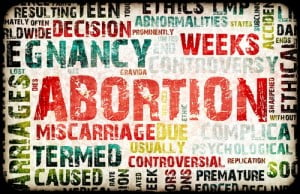It is a bold move in the fight to protect life.
I’m talking about Indiana’s new state law that prohibits federal funds it receives from going to abortion providers like Planned Parenthood.
I first wrote about this issue in June and noted that this law was immediately challenged in federal court by Planned Parenthood and the ACLU – with the backing of the Obama Administration – claiming the law violates a federal statute. Now, the legal battle has moved to the U.S. Court of Appeals for the Seventh Circuit after the enforcement of this law was put on hold following a federal court granting a motion for a preliminary injunction.
Today, we filed a significant amicus brief at the 7th Circuit – on behalf of 41 members of Congress – and more than 25,000 Americans – urging the appeals court to reverse the lower court decision and uphold the Indiana law.
At issue: House Enrolled Act (HEA) 1210 – signed into law in May by Indiana Governor Mitch Daniels. The measure is important because it prohibits the distribution of federal Medicaid funds it receives to organizations like Planned Parenthood that perform abortions. The new law provides, in pertinent part: “An agency of the state may not: (1) enter into a contract with; or (2) make a grant to; any entity that performs abortions or maintains or operates a facility where abortions are performed that involves the expenditure of state funds or federal funds administered by the state.”
Our amicus brief argues that the Indiana law is consistent with federal statutes and is appropriate.
“HEA 1210 is not rendered unreasonable or inconsistent with federal Medicaid law simply because it bolsters Indiana’s strong interests in encouraging childbirth and ensuring that abortions are not directly or indirectly subsidized by public funds,” the brief contends. “Indiana may reasonably conclude that sending large sums of public funds to abortion providers that also provide non-abortion services within the same organization serves to indirectly subsidize abortion activities.”
The brief asserts that Indiana has a legal right to determine how the Medicaid dollars entrusted to it for administering are distributed.
According to the brief: “Federal Medicaid statutes and regulations give States broad discretion to craft the rules applicable to their Medicaid programs. Congress left intact the States’ authority to determine what makes an entity qualified to provide Medicaid services, 42 U.S.C. § 1396a(p)(1), while ensuring that Medicaid recipients may utilize any practitioner deemed to be qualified under State law, 42 U.S.C. § 1396a(a)(23). Since HEA 1210 does not limit a beneficiary’s ability to choose among providers that are deemed to be qualified, it is consistent with federal Medicaid law.”
 Also, our brief, which is posted here, urges the appeals court to overturn the lower court decision saying it is concerned by the Plaintiff’s “novel claim that abortion providers have a constitutional right to perform abortions and receive public funds; if accepted, this argument would unduly restrict the policy discretion that Congress and state and local governments have to decide how to spend public funds.”
Also, our brief, which is posted here, urges the appeals court to overturn the lower court decision saying it is concerned by the Plaintiff’s “novel claim that abortion providers have a constitutional right to perform abortions and receive public funds; if accepted, this argument would unduly restrict the policy discretion that Congress and state and local governments have to decide how to spend public funds.”
In our brief, we represent 41 members of the U.S. House of Representatives, including the entire GOP Indiana delegation in the House. Here’s the complete list of the House members that we represent: Michele Bachmann, Larry Bucshon, Dan Burton, Francisco “Quico” Canseco, Michael Conaway, John Fleming, Bill Flores, Randy Forbes, Virginia Foxx, Trent Franks, Scott Garrett, Vicky Hartzler, Jeb Hensarling, Tim Huelskamp, Randy Hultgren, Lynn Jenkins, Bill Johnson, Walter Jones, Jim Jordan, Mike Kelly, Steve King, John Kline, Doug Lamborn, Jeff Landry, James Lankford, Robert Latta, Kenny Marchant, Thaddeus McCotter, Cathy McMorris Rodgers, Jeff Miller, Alan Nunnelee, Ron Paul, Mike Pence, Joe Pitts, Mike Pompeo, Todd Rokita, Chris Smith, Lamar Smith, Marlin Stutzman, Glenn Thompson, and Todd Young.
We also represent more than 25,000 Americans who signed on to our Committee to Defund Planned Parenthood’s Abortions at the State Level – many of you who understand that Indiana is on the right track with this measure.
The fact is that the state of Indiana and other states do have the constitutional authority to determine how it spends federal funds. Consider this: Planned Parenthood receives more than $350-million a year in taxpayer funds.
Indiana’s decision to no longer use federal money to fund Planned Parenthood – the nation’s largest abortion provider – is not only a constitutionally sound decision, but one we hope is implemented in other states across the country.

